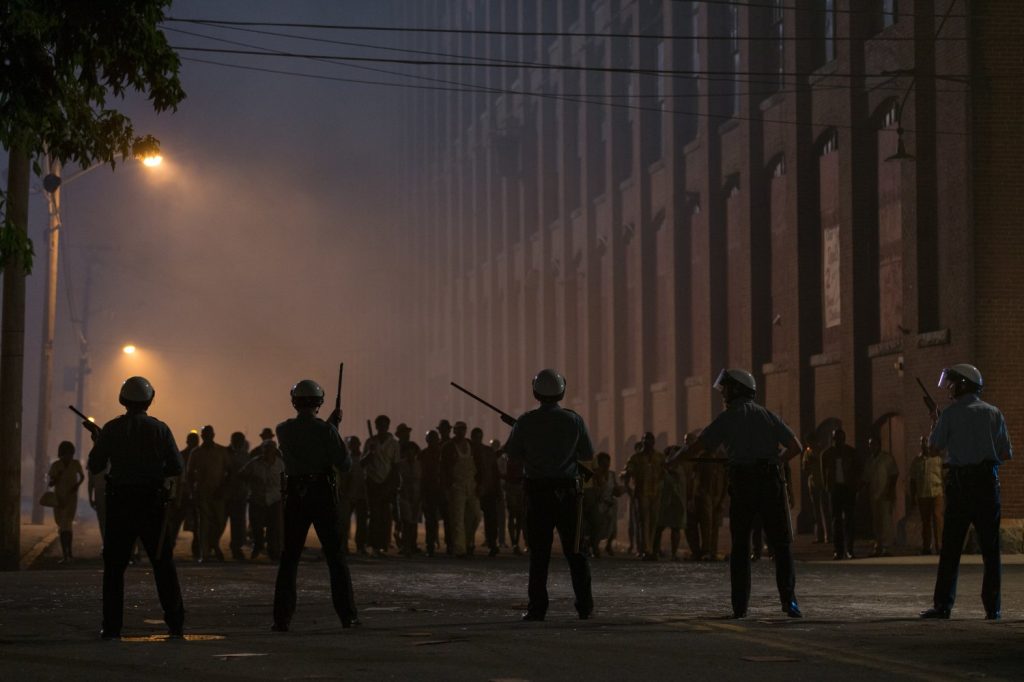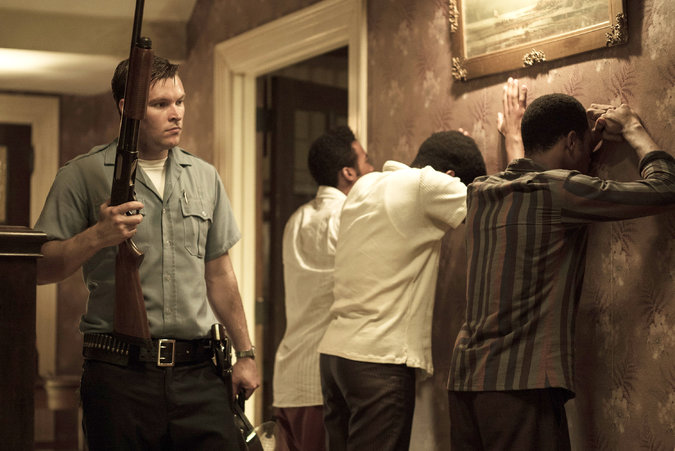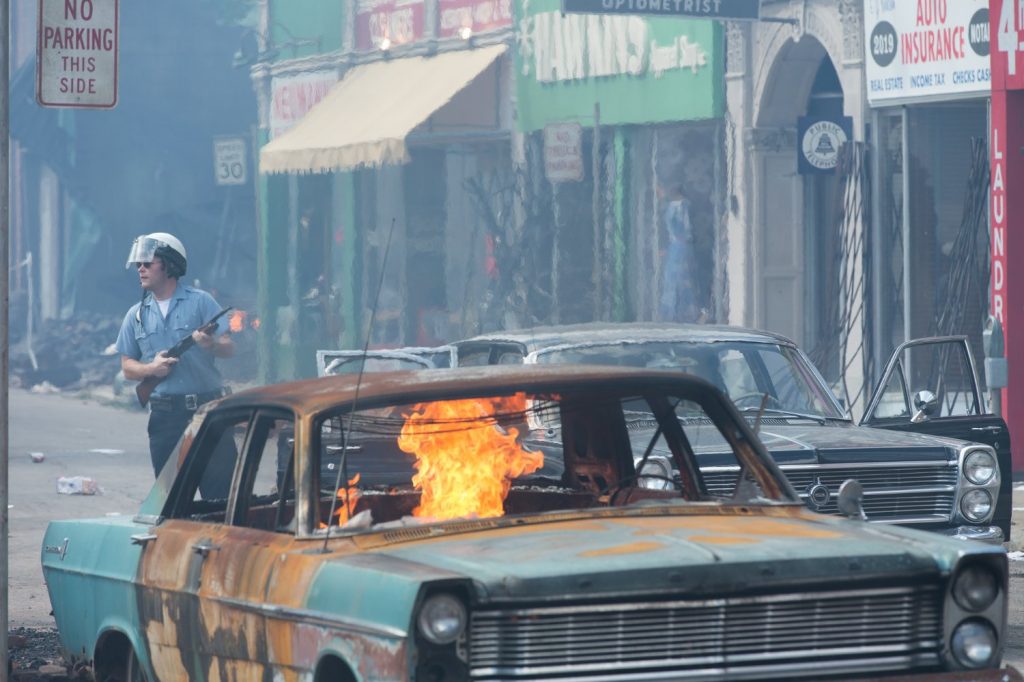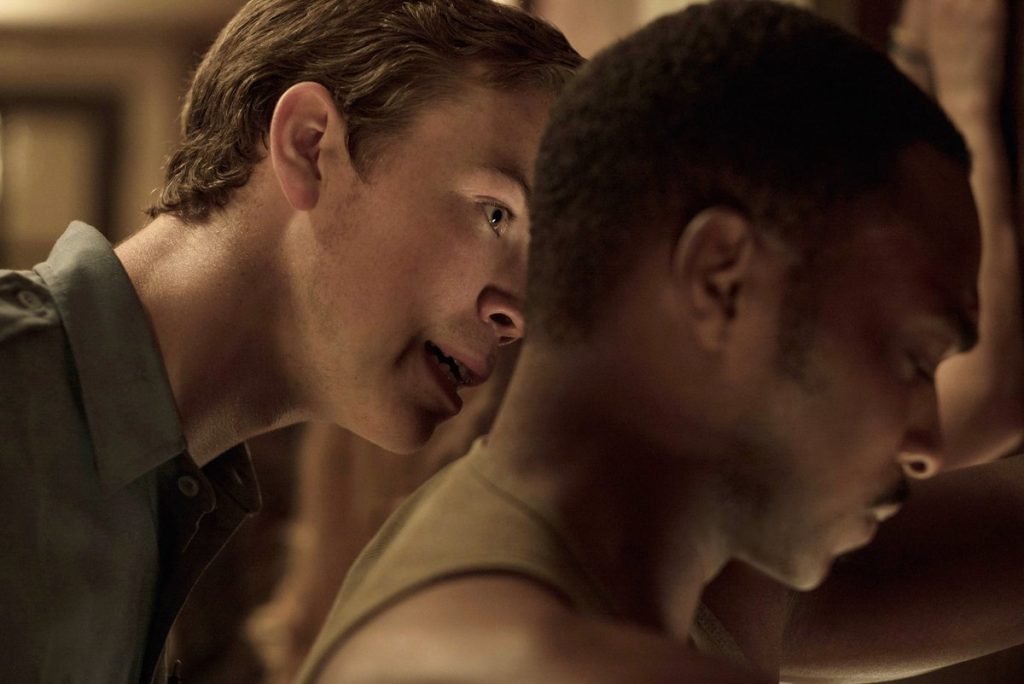 Title: Detroit | Rated: R | Runtime: 143 min | Theaters nationwide
Title: Detroit | Rated: R | Runtime: 143 min | Theaters nationwide
America is built on blood and skin. We don’t seem to have much trouble accepting the former (violence has and will always have a place in our nation), but the same can’t be said for the latter. As far as my American history education goes, my classes covered the essential facts about slavery and the Civil Rights movement and then skimmed over other race-centered topics like the Trail of Tears, the Mexican Repatriation, the internment of Japanese Americans, and so on. Sure, certain college courses delve into those, but there remains this impression that we Americans in general are ignorant of or simply don’t like to talk about how prominent of a role racism plays in our nation’s history. Couple that with the news of racism popping up on a daily basis now, and it’s clear that we must confront this ugly reality head-on by acknowledging it, educating ourselves, listening empathically, and actively amending where need be. Cinema can play a role in these processes, particularly when it comes to portraying events or people that we know little (if any) about. That’s where director Kathryn Bigelow and screenwriter Mark Boal, the team behind The Hurt Locker and Zero Dark Thirty, come in. Their latest venture Detroit, which tackles the Algiers Motel incident during the 1967 Detroit Riot (take a moment to ask yourself if you ever heard of it), is a bit narratively unbalanced and emotionally stunted, but there’s no denying its immersion and intensity.
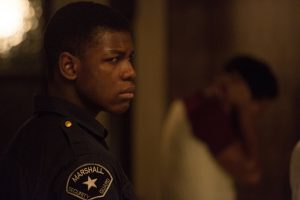 In the summer of 1967, a police night raid – consisting primarily of white officers – on an unlicensed Detroit bar leads to its black patrons being forced outside and herded onto vehicles. The commotion attracts nearby locals, who become incensed by the cops’ rough treatment. Their anger boils over, and soon buildings are ablaze and property destroyed or stolen. As chaos escalates, the National Guard is deployed, and some white police officers like Krauss (Will Poulter) and Flynn (Ben O’Toole) prove to be trigger-happy whenever they think that a black person is doing anything suggestive. The riots have the entire city on edge, and one night – specifically that of July 25-26 – of unrest rattles Motown performer Larry (Algee Smith) and his friend Fred (Jacob Latimore). They find shelter at the Algiers Motel, and all seems well until fellow occupant Carl (Jason Mitchell), frustrated at the mistreatment of blacks, fires a starter pistol at a nearby group of National Guardsmen to scare them. Thinking that the shots came from a sniper, the Guardsmen deploy to the motel, along with police and Melvin (John Boyega), a black security guard wanting to keep the peace. The Guardsmen and police pepper the motel with actual bullets, terrifying those inside and killing one. Krauss and his fellow officers assume control and – believing there is an actual gun and intent on finding it – proceed to cruelly intimidate, harass, and beat the surviving occupants.
In the summer of 1967, a police night raid – consisting primarily of white officers – on an unlicensed Detroit bar leads to its black patrons being forced outside and herded onto vehicles. The commotion attracts nearby locals, who become incensed by the cops’ rough treatment. Their anger boils over, and soon buildings are ablaze and property destroyed or stolen. As chaos escalates, the National Guard is deployed, and some white police officers like Krauss (Will Poulter) and Flynn (Ben O’Toole) prove to be trigger-happy whenever they think that a black person is doing anything suggestive. The riots have the entire city on edge, and one night – specifically that of July 25-26 – of unrest rattles Motown performer Larry (Algee Smith) and his friend Fred (Jacob Latimore). They find shelter at the Algiers Motel, and all seems well until fellow occupant Carl (Jason Mitchell), frustrated at the mistreatment of blacks, fires a starter pistol at a nearby group of National Guardsmen to scare them. Thinking that the shots came from a sniper, the Guardsmen deploy to the motel, along with police and Melvin (John Boyega), a black security guard wanting to keep the peace. The Guardsmen and police pepper the motel with actual bullets, terrifying those inside and killing one. Krauss and his fellow officers assume control and – believing there is an actual gun and intent on finding it – proceed to cruelly intimidate, harass, and beat the surviving occupants.
Like he did with The Hurt Locker and Zero Dark Thirty, Boal takes a journalistic approach to Detroit, which lacks narrative tightness but certainly immerses us in the material. A strikingly animated introduction provides a historical background of blacks living in Detroit, covering the Great Migration, white flight, and the economic and social struggles that they face. This is a great way for us to empathize with the outraged onlookers at the beginning – they’re acting out not just because of this one raid, but because of the history of frustration, police brutality, and racism they’ve had to put up with for far too long. These feelings become all the more clear in a sequence where Congressman John Conyers (Laz Alonso) attempts to calm a crowd with promises of change coming, which only aggravates them further. They fuel the rest of the film as well, reminding us about the greater context of the Algiers incident. It must be said that since the events that transpired at the Algiers still aren’t entirely clear to this day, the film is a dramatization of them. Still, it makes for a heart-wrenching and vivid second act, which succeeds at making us increasingly uncomfortable. It’s so powerful that there’s a noticeable dip when moving onto the third act; it rushes through the fallout from the Algiers and doesn’t quite reach the emotional heights that it strives for, so it feels slightly disconnected from the first and second acts despite dealing with the same thematic material.
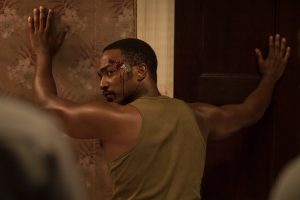 Where Boal’s script does fall short is in its portrayal of several characters. That’s not to say they’re terribly written or dull (quite the opposite, really), but they get the short end of the stick when it comes to development, and as a result, the emotional impact they have on the story is arguably stunted. Yes, Boal has the unenviable task of juggling a host of characters here, and while he finds a working balance to accommodate them all, a handful of them receive proper introductions to get them started on their arcs while others come in a little too late. The latter holds true for two characters (I won’t name them for the sake of spoilers) who end up becoming unfortunate victims, and when they met their ends, I felt sympathy but not the full weight of the tragedy, which would have been realized had I truly got to know them as human beings like I did with some of the other characters like Larry, Fred, and Melvin.
Where Boal’s script does fall short is in its portrayal of several characters. That’s not to say they’re terribly written or dull (quite the opposite, really), but they get the short end of the stick when it comes to development, and as a result, the emotional impact they have on the story is arguably stunted. Yes, Boal has the unenviable task of juggling a host of characters here, and while he finds a working balance to accommodate them all, a handful of them receive proper introductions to get them started on their arcs while others come in a little too late. The latter holds true for two characters (I won’t name them for the sake of spoilers) who end up becoming unfortunate victims, and when they met their ends, I felt sympathy but not the full weight of the tragedy, which would have been realized had I truly got to know them as human beings like I did with some of the other characters like Larry, Fred, and Melvin.
In Bigelow’s hands, the second act is nothing short of an absolute marvel, as she turns it into a grueling and unforgettable experience. The moment the police and National Guardsmen enter the Algiers, this historical drama becomes a horror film, a home invasion thriller where these armed men are the bad guys in control, with their racism being the evil force that demands blood and cannot be stopped. Seeing this monster compel these white men to ignore civil liberties, roar terrible things, ram their weapons into black flesh, and live out what are essentially their fantasies is simply terrifying, and what makes it worse is the sinking realization that they can get away with it all. Where there is black, racism strikes ruthlessly, no matter who comes in its way. This includes white Ohio women Julie (Hannah Murray) and Karen (Kaitlyn Dever), caught in the mere act of playing cards with black Vietnam War veteran Greene (Anthony Mackie), whose service to his country and declarations of his innocence do not spare him from the cops’ suggestion that he is pimping out Julie and Karen. I imagine some viewers will be baffled by how none of the Algiers occupants reveal that the gun Carl fired is a starter gun, but the point that Bigelow makes here is that even telling the truth cannot stave off racism’s threats and violence. The only thing that Larry, Fred, and the others can do is endure and survive this terrible night – and we feel their sweat, tears, and excruciating fear.
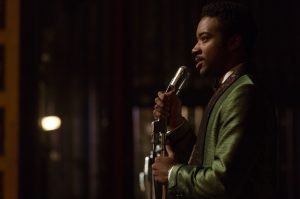 Bigelow has assembled an outstanding ensemble cast, and they give it their all. Larry is arguably the closest to being the film’s lead character, and Smith naturally brings him to life with his charisma and wide emotional range. Latimore too is a winner, and the chemistry he establishes with Smith allows the two to bring the best out of each other for the scenes they share. Boyega’s calming presence alone says so much about the seemingly passive Melvin, who doesn’t want this riot and the Algiers incident to end with any more deaths. Poulter is fucking scary here, as is O’Toole as the racist cops whose anger becomes all the more explosive with each passing minute. They’re so unbelievably repugnant that even the sight of them flashing grins should be enough to make anyone queasy. Dever and Murray make the transition from lively to frightened with ease, and both of them effortlessly hit their emotional high moments. Though their characters for the most part remain on the sidelines, Mitchell, Mackie, and the other cast members prove to be quite reliable and try to make the most of their moments.
Bigelow has assembled an outstanding ensemble cast, and they give it their all. Larry is arguably the closest to being the film’s lead character, and Smith naturally brings him to life with his charisma and wide emotional range. Latimore too is a winner, and the chemistry he establishes with Smith allows the two to bring the best out of each other for the scenes they share. Boyega’s calming presence alone says so much about the seemingly passive Melvin, who doesn’t want this riot and the Algiers incident to end with any more deaths. Poulter is fucking scary here, as is O’Toole as the racist cops whose anger becomes all the more explosive with each passing minute. They’re so unbelievably repugnant that even the sight of them flashing grins should be enough to make anyone queasy. Dever and Murray make the transition from lively to frightened with ease, and both of them effortlessly hit their emotional high moments. Though their characters for the most part remain on the sidelines, Mitchell, Mackie, and the other cast members prove to be quite reliable and try to make the most of their moments.
War is hell, and Bigelow brings that sentiment to this film. Cinematographer Barry Ackroyd’s jittery, documentary-style camerawork lends an “on the ground” feel that enhances confusion and fear, and it complements the ugliness of the subject matter. His style reaches its full strength in the second act, as being in the tight hallways and rooms of the Algiers heightens a sense of claustrophobia that becomes appropriately unbearable. Under the eye of production designer Jeremy Hindle, Detroit is depicted as a chaotic war zone, where litter serves as debris, smoldering buildings as impact craters from bombs, and secured stores as bases to be protected. The sound editing too is tremendous, as every sharp crack and reverberating boom of gunfire is keenly felt as a sudden punch to the gut.
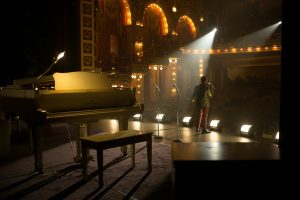 Detroit isn’t a perfectly crafted piece of storytelling, but its anger and ability to place us in the shoes of its subjects make it a powerful piece of filmmaking that demands to be seen and remembered. While the film covers events that occurred half a century ago, they undoubtedly feel relevant now, reminding us of the Ferguson unrest, the countless deaths of black men and women, and so on. America may have progressed since 1967 in many ways, but when it comes to racism, it has remained rooted in the past. The more things change, the more they stay the same. But just because they stay the same doesn’t mean they have to be.
Detroit isn’t a perfectly crafted piece of storytelling, but its anger and ability to place us in the shoes of its subjects make it a powerful piece of filmmaking that demands to be seen and remembered. While the film covers events that occurred half a century ago, they undoubtedly feel relevant now, reminding us of the Ferguson unrest, the countless deaths of black men and women, and so on. America may have progressed since 1967 in many ways, but when it comes to racism, it has remained rooted in the past. The more things change, the more they stay the same. But just because they stay the same doesn’t mean they have to be.
Rating: 4.0/5.0
* Photos courtesy of Annapurna Pictures

